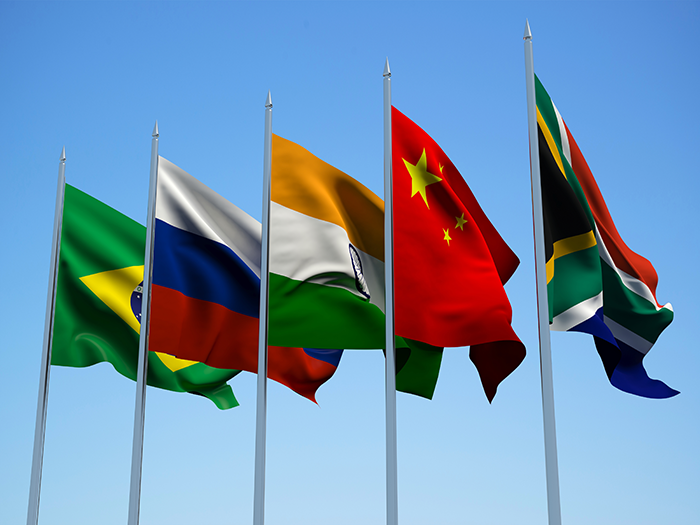Interviews
6 June 2024
BRICS+: Towards a Reconfiguration of the International Order?

With the accession of Egypt, Ethiopia, Saudi Arabia, the United Arab Emirates and Iran to the BRICS group in early 2024, the organisation now embodies a set of states wielding significant influence on the international stage, representing 46% of the world’s population and 29% of global GDP. As 2024 marks an important electoral year for several BRICS members, further expansions may occur in the coming years. Are we moving towards an alternative international order? What are the strategic advantages of BRICS+? Can they represent the voice of the Global South? An interview with Jean-Joseph Boillot, Associate Research Fellow at IRIS and specialist in the Indian economy and emerging markets.
A new term for Vladimir Putin in Russia, a historic setback for the African National Congress (ANC) in South Africa’s elections, a narrow victory for Narendra Modi in India, upcoming elections in Iran following the death of Ebrahim Raisi and in Ethiopia… 2024 is a pivotal electoral year for many BRICS+ countries. Could these elections have repercussions on the international agenda of BRICS+ states?
That is quite possible, since the BRICS+ form a fairly heterogeneous group. As we saw in Argentina, the election of Javier Milei, a pro-American liberal, led to the country’s exit from the group. What is interesting, however, is that—even in India, where Narendra Modi was re-elected with a slim majority—the majority of so-called Global South countries are fundamentally united around a strong internal consensus aimed at finally breaking free from the Western-led international order inherited from Bretton Woods. So changes in leadership do not necessarily call that consensus into question—one or two exceptions aside. While some would like to portray BRICS+ as an anti-Western, confrontational club, the reality is that with the recent inclusion of Saudi Arabia, the UAE and Egypt, the prevailing consensus leans more towards multi-alignment—much like India, which has drawn closer to the United States in recent times without severing ties with Russia. At present, elections in the developing world do not appear to be undermining this broad consensus in the South—and I’m not referring here to sham elections such as Russia’s under Putin.
Since the expansion of BRICS+ in early 2024, how should we assess the group’s economic reach? What are its strategic strengths and advantages?
The idea of a BRICS+ grouping more powerful than Western economies and capable of upending the global order has not come to pass—nor, however, are the BRICS+ marginal to global economic developments. What we are witnessing is that the BRICS+ function more as a flexible coalition, driven by the political will of Southern states to be taken seriously in international forums—still overwhelmingly dominated by the West—rather than as a fully-fledged alternative global order, except perhaps in Moscow’s imagination. This is illustrated by the fact that the BRICS presidency has passed to Russia this year, since Brazil is holding the G20 presidency and could not manage both. When we look at how Russia is managing the preparatory sessions for the upcoming summit in Kazan this October, it’s clear the agenda is rather empty. There have been virtually no meetings, and no decisions taken. On the monetary front, for example, the proposed common currency has made no progress.
This is somewhat reassuring, as it suggests we are heading not towards a confrontational world split into two blocs, but towards a North–South contestation played out within the existing international architecture—particularly through institutions in need of reform, such as the International Monetary Fund (IMF) and the World Bank, which remain heavily dominated by Western powers, unlike the United Nations, which offers broader representation to countries from the South.
It is worth noting, however, that the entry of Saudi Arabia, Iran and the UAE is contributing to a kind of “cartelisation” of the world under the BRICS umbrella in key sectors such as raw materials, food, energy and metals. Some Southern states now hold strong political leverage over critical raw materials, which they are asserting. This poses a challenge, because the majority of so-called Global South countries are not in fact producers of these materials. As such, the BRICS+ may experience—not necessarily conflict at this stage, but—difficulty in striking a balance between the interests of producer and consumer countries. Africa, for example—potentially a future giant in raw materials—is being courted by China, but also by Russia and the Gulf States. The challenge for the continent will be to avoid falling into dependence on such a cartel.
With Thailand recently applying to join BRICS+, and countries such as Mexico, Algeria and Turkey also considering membership, what future lies ahead for BRICS+? Can the group coherently represent the so-called ‘Global South’?
It seems unlikely that BRICS+ will evolve into either a structured organisation or a unified voice for the Global South. The reason lies in the fact that a majority of countries pursue a policy of multi-alignment or double-dealing between Western powers and the broader emerging or re-emerging powers of the South—including Russia. The vast majority of the developing world does not want to fall into a dependency on Russia or China. Countries like Angola, which experienced such dependence during the Cold War, are now regretting it. The enlargement of BRICS—which is set to continue, though likely at a moderate pace—has the effect of diluting power within the organisation, preventing any one group from gaining dominance. This helps explain the slow pace on issues such as a monetary alternative to the dollar, or the actual disbursements from the BRICS Bank, which is now headed by a Brazilian.
We are therefore likely to see BRICS+ evolve into something more akin to a forum—a pre-G20 platform, perhaps—since the group has established the habit of meeting before each G20 or other major international summit, with the aim of coordinating Southern positions and exerting collective influence, much as the G7 countries have done. The expansion of BRICS to include countries with somewhat different perspectives and interests than the five founding members—such as Algeria, Indonesia, Vietnam or Thailand, whose candidacy appears serious—is a positive development. It will also be interesting to see whether the election of Mexico’s new president affects the country’s position regarding BRICS membership, given the United States’ firm opposition.
Among the four scenarios outlined by French scholar Julien Vercueil, the most likely appears to be continued BRICS expansion, rather than its disintegration and decline, as some had predicted. Yet in this scenario, rather than a clean divide between North and South, we are likely to see a growing contestation leading to gradual reform of the global economic order. This seems the most plausible outcome, given the way the first enlargement was conducted. A second enlargement may not happen in 2024, since India and Brazil are not particularly in favour. The candidate countries will likely have to wait until 2025. But what is one year when we are talking about reforming the world’s architecture?

